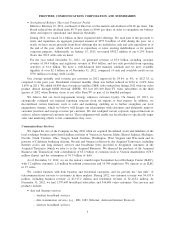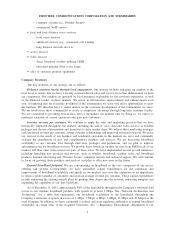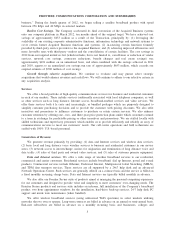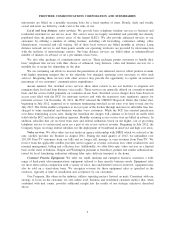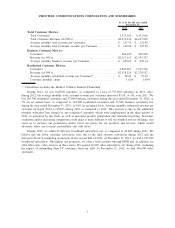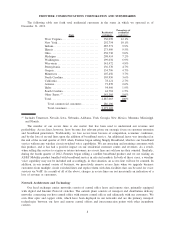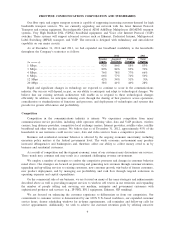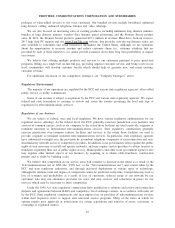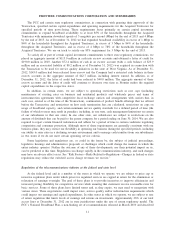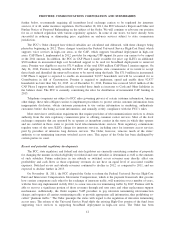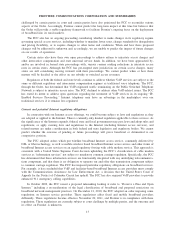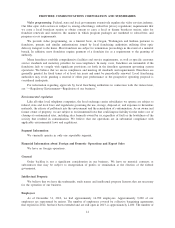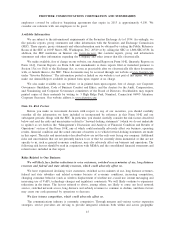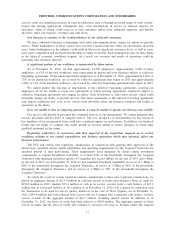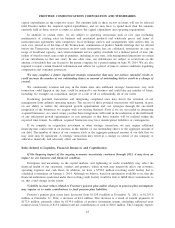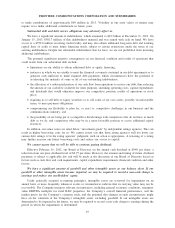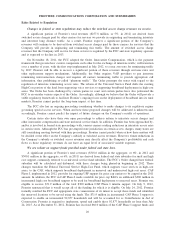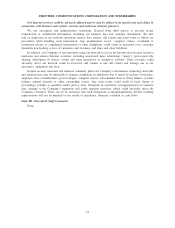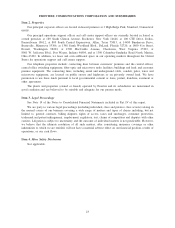Frontier Communications 2012 Annual Report Download - page 14
Download and view the complete annual report
Please find page 14 of the 2012 Frontier Communications annual report below. You can navigate through the pages in the report by either clicking on the pages listed below, or by using the keyword search tool below to find specific information within the annual report.challenged by certain parties in court and certain parties have also petitioned the FCC to reconsider various
aspects of the Order. Accordingly, Frontier cannot predict the long-term impact at this time but believes that
the Order will provide a stable regulatory framework to facilitate Frontier’s ongoing focus on the deployment
of broadband into its rural markets.
The FCC also has an ongoing proceeding considering whether to make changes in its regulatory regime
governing special access services, including whether to mandate lower rates, change standards for deregulation
and pricing flexibility, or to require changes to other terms and conditions. When and how these proposed
changes will be addressed is unknown and, accordingly, we are unable to predict the impact of future changes
on our results of operations.
Certain states also have their own open proceedings to address reform to intrastate access charges and
other intercarrier compensation and state universal service funds. In addition, we have been approached by,
and/or are involved in formal state proceedings with, various carriers seeking reductions in intrastate access
rates in certain states. Although the FCC has pre-empted state jurisdiction on certain access charges, many
states are still considering moving forward with their proceedings. We cannot predict when or how these
matters will be decided or the effect on our subsidy or switched access revenues.
Regulators at both the federal and state levels continue to address whether VoIP services are subject to the
same or different regulatory and intercarrier compensation regimes as traditional voice telephony. The FCC,
through the Order, has determined that VoIP-originated traffic terminating on the Public Switched Telephone
Network is subject to interstate access rates. The FCC declined to address other VoIP-related issues. The FCC
has stated its intent to address open questions regarding the treatment of VoIP services in its ongoing “IP-
Enabled Services Proceeding.” Internet telephony may have an advantage in the marketplace over our
traditional services if it remains less regulated.
Current and potential Internet regulatory obligations
In connection with our Internet access offerings, we could become subject to laws and regulations as they
are adopted or applied to the Internet. There is currently only limited regulation applicable to these services. As
the significance of the Internet expands, federal, state and local governments may pass laws and adopt rules and
regulations, or apply existing laws and regulations to the Internet (including Internet access services), and
related matters are under consideration in both federal and state legislative and regulatory bodies. We cannot
predict whether the outcome of pending or future proceedings will prove beneficial or detrimental to our
competitive position.
The FCC adopted orders which put wireline broadband Internet access service, commonly delivered by
DSL or fiber technology, as well as mobile wireless based broadband Internet access service and other forms of
broadband Internet access services on an equal regulatory footing with cable modem service. This approach is
consistent with a United States Supreme Court decision upholding the FCC’s classification of cable modem
services as “information services” not subject to mandatory common carriage regulation. Specifically, the FCC
has determined that these information services are functionally integrated with any underlying telecommunica-
tions component, and that there is no obligation to separate out and offer that transmission component subject
to common carriage regulation. The FCC has imposed particular regulatory obligations on broadband services.
For example, it has concluded that VoIP and facilities-based broadband Internet access providers must comply
with the Communications Assistance for Law Enforcement Act, a decision that the United States Court of
Appeals for the District of Columbia Circuit has upheld. The FCC has also required VoIP providers to provide
enhanced 911 emergency calling capabilities.
In October 2009, the FCC issued a proposed rulemaking looking at rules to “Preserve a Free and Open
Internet,” including a reconsideration of the legal classification of broadband and proposed restrictions on
broadband network management practices. On December 21, 2010, the FCC adopted an order imposing some
regulations on Internet service providers. These regulations affect fixed and mobile broadband providers
differently. These regulations became effective November 20, 2011, and Frontier is in compliance with these
regulations. These regulations are currently subject to court challenge by multiple parties, and the outcome and
its effect on Frontier is unknown.
13
FRONTIER COMMUNICATIONS CORPORATION AND SUBSIDIARIES


